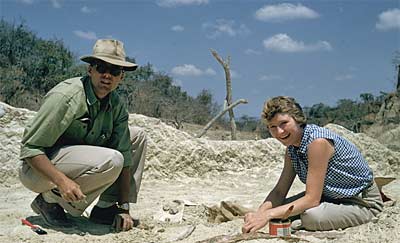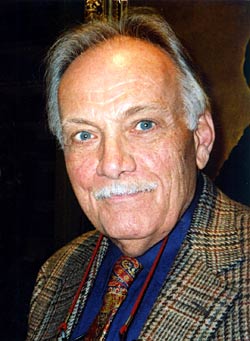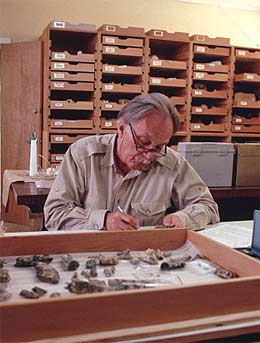UC Berkeley Press Release
 |
Clark and Betty Howell at a dig in Isimila, Tanzania in 1957. |
Famed paleoanthropologist Clark Howell has died
BERKELEY – Francis Clark Howell, one of the giants of paleoanthropology and the first to bring fields such as geology, ecology and primatology to bear on understanding human origins, died Saturday, March 10, at his home in Berkeley.
Howell, 81, a professor emeritus of anthropology at the University of California, Berkeley, was diagnosed last year with cancer.
 Francis Clark Howell |
"His reach was truly global," said Tim White, UC Berkeley professor of integrative biology who co-directed with Howell the campus's Human Evolution Research Center, which was founded originally by Howell as the Laboratory for Human Evolutionary Studies in 1970.
"Clark's central importance since the 1950s has been to make paleoanthropology what it is today - that is, the integration of archaeology, geology, biological anthropology, ecology, evolutionary biology, primatology and ethnography," said White. "When you look at a modern paleoanthropology project, whether in Tanzania or South Africa or Ethiopia, you find Clark's stamp everywhere. He personified modern paleoanthropology."
He left his stamp equally on the Leakey Foundation, with which he was involved from its founding in 1968 until late last year. As a founder and trustee of the foundation and a member of the science and grants committee, he steered funding to a broad range of disciplines apart from the "stones and bones" of classical physical anthropology.
"He has provided not only the scientific rigor but the vision of the Leakey Foundation," said Don Dana, vice president of the foundation's board of trustees and chair of the trustees' Grants Committee.
"Truly, he is the father of physical anthropology, in the sense that it was really Clark, in his early expeditions in places like Ethiopia, who basically said we need to bring in a multitude of disciplines to understand (the problem of human origins)," Dana added. "He is the one who took paleoanthropology from a fossil recovery type of science to a science where we had to understand the geology, the flora and fauna, the chemistry, everything. His role, from that point of view, is just enormous. He is a tremendous, incalculable loss to the foundation."
White noted that, under Howell, the foundation supported Jane Goodall's work on chimpanzees, that of Biruté Galdikas on orangutans, and the research of the late Diane Fossey on gorillas, as well as studies of modern human hunter gatherers.
"The foundation is such an important underpinning for paleoanthropology today. Clark was the one who turned it into a foundation that functions something like the National Science Foundation, but specifically for paleoanthropology," White said. "I think Clark's influence was crucial to keeping not only that breadth, but being able to assemble those types of different fields."
Howell came to prominence in the 1950s and 1960s as the field of African anthropology was becoming more professional and more academic. He worked alongside Louis, Mary and Richard Leakey, and together they focused attention on eastern Africa as the likely nursery of human evolution, as opposed to other regions of the continent.
 Howell studying Aramis carnivores in 1992 at the NSF Paleoanthropology Laboratory in Addis Ababa, Ethiopia. (Tim White photo) |
He led and participated in digs around the world, ranging from Ethiopia, Kenya and Tanzania to Turkey, Spain and China. His signature dig was at a site in the Omo basin of southern Ethiopia, where he led a U.S. contingent from 1968 through 1973. It was here that his team's work revealed fossils and stone tools that helped document a three-million-year succession of human ancestors and collateral species. In this Omo work, Howell established the multidisciplinary standard for modern paleoanthropology.
He also directed in the early 1980s the Ambrona Research Project at a human occupation site in Soria, Spain, that dated from the early Acheulian period. In the late 1980s, he co-directed a cave excavation at Yarimburgaz in Turkey, and he continued his exploration of sites in Turkey in the early 1990s.
After his retirement from UC Berkeley in 1991, he worked with White and colleagues on fossils collected from the Middle Awash Valley of Ethiopia, where hominids spanning nearly 6 million years of evolution were uncovered by an international team that today includes African scholars trained by Howell.
He mentored numerous students, including young scientists from Ethiopia, Malawi and Tanzania, often in concert with the J. Desmond Clark, a UC Berkeley archaeologist who died in 2002, and White. According to Middle Awash project geologist Giday WoldeGabriel of Los Alamos National Laboratory in New Mexico, Howell "was a genuine advocate for the advancement of Africans and paleoanthropology research in Africa. We will miss him, and we will carry on with his ideals."
According to White, who got interested in the field as a teenager after reading Howell's 1965 Time/Life Nature Library book, "Early Man," Howell was an excellent popularizer of the science of human origins. He made the first publicly broadcast film on the subject, an award-winning 1969 MGM TV special called" The Man-Hunters." He also was scientific advisor to exhibits on early humans at the California Academy of Sciences, where he served as a trustee from 1976 until 1990 and as president from 1980 to 1982.
"This was one of the most effective and longest lasting public outreach efforts, in terms of presenting the science of human evolution to the public," White said. "It helped to define Clark as the central figure in paleoanthropology during the last century."
Howell was born in Kansas City, Mo., on Nov. 27, 1925. After a stint in the U. S. Navy during World War II, he entered the University of Chicago, from which he obtained his undergraduate Ph.B. in 1949, his A.M. in anthropology in 1951 and his Ph.D. in anthropology in 1953.
He was an instructor in anatomy at Washington University School of Medicine in St. Louis from 1953 until 1955, when he joined the faculty of the anthropology department at the University of Chicago. He rose through the ranks to full professor in 1962, and left for UC Berkeley in 1970. He retired in 1991, though he remained active until shortly before his death.
Though trained as a physical anthropologist - his Ph.D. dissertation was on the bone structure of the skull base in humans - he was an avid reader of a broad range of scientific literature. If he couldn't find someone who knew about an area outside his expertise, he would become an expert himself, according to White.
"From the very beginning, he was not one to be bound within subdisciplinary pigeonholes in anthropology," White said. "He was as much a paleolithic archaeologist interested in prehistory as a physical anthropologist interested in anatomy. He integrated the physical, biological and behavioral sciences."
Howell was named a member of the National Academy of Sciences as well as a fellow of the American Academy of Arts and Sciences, the American Philosophical Society, and the American Association for the Advancement of Science. He also was an honorary fellow of the Royal Anthropological Institute of Great Britain and Ireland, as well as of the French Academie des Sciences and the Royal Society of South Africa.
He received the Leakey Prize in 1998, the Franklin L. Burr Award of the National Geographic Society in 1993, and in 1998 the Charles Robert Darwin Award for Lifetime Achievement in Physical Anthropology from the American Association of Physical Anthropologists.
In addition, he was a member of the editorial boards of many journals and a member of the Society of Vertebrate Paleontology, the East African Wildlife Society, and others.
In recognition of his scientific contributions, Howell's name was attached by colleagues to seven newly discovered animal species, most of them extinct. The species range from snails to a hyena to an oryx and include one primate: a loris dubbed Galago howelli.
Howell is survived by his wife, Betty Ann Howell of Berkeley; a son, Brian David Howell of Berkeley; a daughter, Jennifer Clare Howell, and granddaughter, Alisa Howell-Smith, of McMinnville, Ore.; and two sisters, Margaret Johnson and Elizabeth Howell of Charlotte, North Carolina.
A campus memorial service has been scheduled for Monday, May 7, at 4 p.m. in the UC Berkeley Faculty Club.

